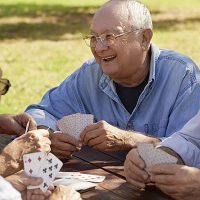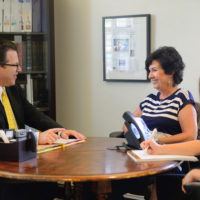Savings Game | Qualifying for Medicaid While Protecting Your Assets
One day, most of us are likely to have an elderly family member who needs round-the-clock care. Putting a transition plan in place now can save you significant money, time and headaches down the road. Medicaid, the state-federal health care program for the poor, pays for about half of all nursing home care in the U.S.
Diana Adams is an attorney in private practice in New York State doing eldercare law. She’s also currently applying for Medicaid for her elderly father. “If families are not prepared, the cost of long-term care is going to quickly absorb all the family’s assets,” she says. “This kind of issue is one of the reasons many middle-class people don’t end up with an inheritance.”
This column will focus on qualifying for Medicaid while protecting your assets. A future column will look at other options, such as long-term care insurance.
1) What can I keep?
When someone goes into a nursing home, he or she can retain up to $13,800 in assets. Any spouse or dependent, if still living independently, is entitled to keep his or her house and a car. On top of that, the so-called “community spouse” can also hold onto at least $21,912 and up to $109,560 of the couple’s joint assets. All of these figures increase with inflation each year and vary by state. You can also use some assets to purchase a prepaid funeral plan.
2) What might I lose?
Besides that house, car, funeral plan and sum of cash, everything else a couple owns is fair game to pay for nursing home care, which costs a median of $115,000 annually in New York state and $62,000 in Alabama.
When you apply for Medicaid, the state looks back at your financial records for five years to establish that you have no further money to pay for care out of pocket. If you put the title of your home in a child’s name or transfer money into a grandchild’s college fund during that five-year look-back period, the government is entitled to take those assets. They will even take the payoff on a life insurance policy. So if you have any reason to believe that someone in your family might need care within five years, now is the best time to hire an eldercare attorney and look into setting up a Medicaid trust or other transfer of assets to try to preserve your inheritance.
(If your relative has completed a major transfer of assets and is almost out of the 60-month look-back period when he or she must go into the nursing home, it might make financial sense to pay out of pocket for a few months before applying for Medicaid.)
3) What’s the application process like?
Most states maintain websites that give you an overview of the process. In brief, you need your Social Security number, tax returns to prove income from federal benefits or private pensions, information on your assets such as bank accounts and insurance policies, a marriage certificate (if any), proof of address such as a mortgage statement or piece of mail, and insurance and Medicare benefit cards. “These are much easier to get together when you’re not in an emergency situation — grandpa fell down the stairs,” says Adams. Most states have “enrollment facilitators” to help with the application; the numbers can be found on the website of your state department of health and human services or equivalent agency. You might also hire an attorney, which can cost hundreds of dollars an hour. Approval can take anywhere from weeks to months.
4) What happens next?
Once your relative is approved for Medicaid and safely placed in care, it’s time to turn your attention to the community spouse or dependent. “The situation changes quickly when the second spouse goes into a nursing home,” says Adams. Only $13,800 in assets can be retained, and the state has the right to put your home up for sale at a bargain-basement price. “Say Dad goes into a nursing home, and Mom stays in the house. You should right away do Medicaid planning for her and get everything out of her name. You could sell the house, or just transfer it to another family member who lets her stay there in an arrangement called a life estate.”
Be cautious and always consult a professional who is familiar with the laws in your particular state before attempting any steps to shield assets from Medicaid, be it a trust, a transfer or a gift. The Deficit Reduction Act of 2005 empowered states to take stronger-than-ever steps to cover Medicaid costs, and lawsuits are a real possibility











